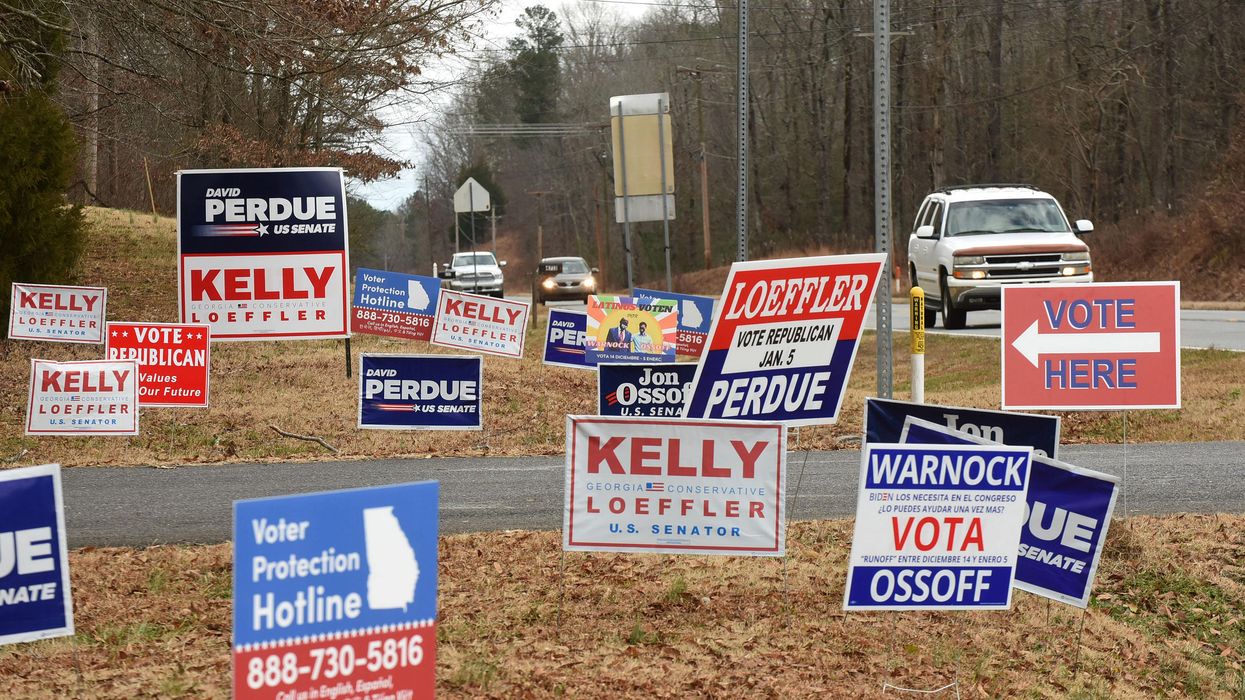The Georgia Republican Party and a conservative nonprofit have come under scrutiny for allegedly violating federal campaign finance law during the state's Senate runoff elections in January.
A pair of good-government groups, the Campaign Legal Center Action and Common Cause Georgia, filed a complaint Wednesday with the Federal Election Commission alleging that True the Vote, which says its mission to restore confidence in elections by combating voter fraud, illegally coordinated with the Georgia Republican Party ahead of the runoffs.
As a 501(c)(3) nonprofit corporation, True the Vote is prohibited from donating directly or indirectly to a political committee. Because it coordinated with the Georgia GOP, the complaint alleges, both parties violated campaign finance rules.
In December, True the Vote founder Catherine Engelbrecht announced in an email to supporters and in a press release that the Texas-based organization would assist the Georgia Republican Party with the runoffs. Her group helped with signature verification training, ballot curing support, a voter hotline, absentee ballot drop box monitoring and other election integrity initiatives.
Federal law prohibits corporations from making contributions — which include "coordinated expenditures" — to a political committee (other than a super PAC). The complaint alleges that the services True the Vote provided constitute expenditures and because they were done at the request of and in coordination with the state GOP, the activity amounts to prohibited in-kind contributions.
"It doesn't matter if True the Vote expressly urged voters to elect Republicans, the relevant legal question is whether True the Vote spent money 'in connection with an election' and coordinated that spending with the Georgia Republican Party," said Brendan Fischer, CLCA's director of federal reform. "The evidence shows that it did."
True the Vote did not immediately respond to a request for comment.
At the time the partnership was announced, Georgia Republican Party Chairman David Shafer wrote that he was grateful for True the Vote's help in fighting for election integrity. "The resources of True the Vote will help us organize and implement the most comprehensive ballot security initiative in Georgia history," he said in the press release.
While working with the Georgia GOP, True the Vote challenged the eligibility of more than 364,000 voters ahead of the runoffs, claiming those voters may have recently moved and therefore weren't eligible to vote. In response, Stacey Abrahm's voting rights group Fair Fight filed a lawsuit alleging True the Vote's challenge amounted to voter intimidation.
A federal judge ultimately denied Fair Fight's request to stop the challenge, but expressed "grave concerns" about True the Vote challenging hundreds of thousands of voters' eligibility so close to the runoffs.
CLCA and Common Cause Georgia went further, filing a complaint.
"Corporations are not supposed to act as arms of campaigns, and since coordinated spending is just as valuable to candidates and political parties as direct contributions, coordination between outside spenders and their preferred political party must be strictly policed and enforced," the groups wrote in their press release about the complaint.
It will now be reviewed by FEC staff attorneys, who will develop a report and recommendation to the six commissioners about whether there is reason to believe the law was violated.
But this won't likely be a quick process. While the complaint's review will only take a few months, it could sit in the FEC's backlog of pending cases for as long as two years, Fischer said, since the agency has been slow to move on such issues.
If the FEC fails to take action in a timely manner, CLCA and Common Cause Georgia could sue the agency in order to have the complaint addressed more expeditiously.
"This is a striking example where the violations were hiding in plain sight," Fischer said. "We hope and expect that the FEC would enforce the law here and penalize both True the Vote and the Georgia Republican Party for this unlawful coordinated activity."




















